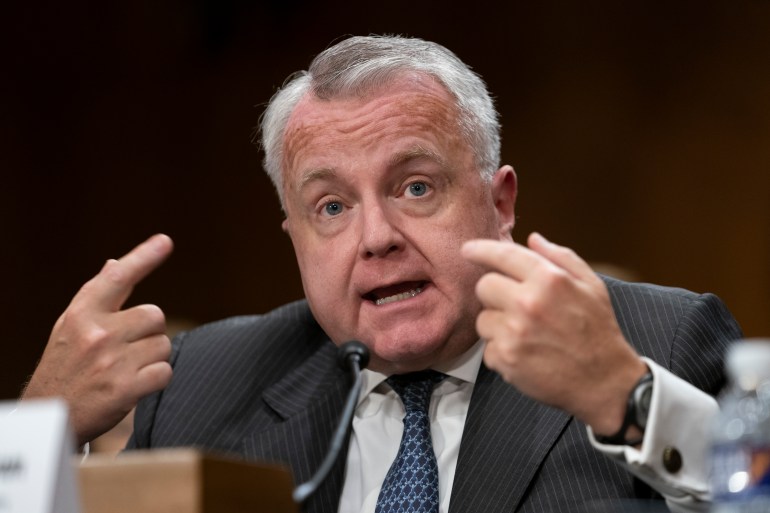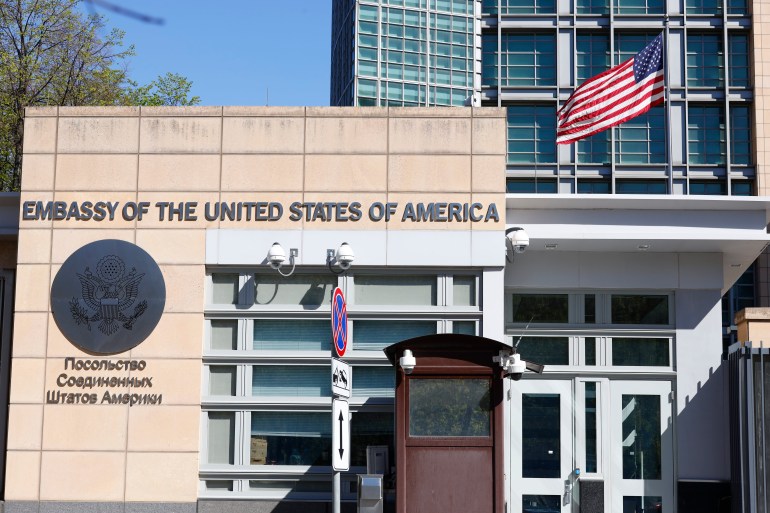Ukraine war: US ambassador urges Russia not to close embassy
John Sullivan says Washington and Moscow ‘must preserve the ability to speak to each other’, Russian state media reports.

Sullivan says it would be a 'big mistake' if Russia and the US were to close embassies [File: J. Scott Applewhite/AP Photo]
Published On 6 Jun 20226 Jun 2022
Russia should not close the US embassy despite the crisis triggered by the war in Ukraine because the world’s two biggest nuclear powers must continue to talk, the US ambassador to Moscow has been quoted as saying.
When asked whether the two countries’ embassies could be shut down, John Sullivan told the Russian state news agency TASS on Monday that such a move would be “a big mistake”.
President Vladimir Putin has presented the invasion of Ukraine as a turning point in Russian history: a revolt against the hegemony of the United States, which the president says has humiliated Russia since the 1991 fall of the Soviet Union.
Ukraine – and its Western allies – says it is fighting for its survival against a reckless imperial-style land grab which has killed thousands, displaced more than 10 million people and reduced swathes of the country to wasteland.
In a clear attempt to send a message to the Kremlin, Sullivan, who was appointed US ambassador by President Donald Trump, told TASS that Washington and Moscow should not break off diplomatic relations.
“We must preserve the ability to speak to each other,” Sullivan was quoted as saying.
Published On 6 Jun 20226 Jun 2022
Russia should not close the US embassy despite the crisis triggered by the war in Ukraine because the world’s two biggest nuclear powers must continue to talk, the US ambassador to Moscow has been quoted as saying.
When asked whether the two countries’ embassies could be shut down, John Sullivan told the Russian state news agency TASS on Monday that such a move would be “a big mistake”.
President Vladimir Putin has presented the invasion of Ukraine as a turning point in Russian history: a revolt against the hegemony of the United States, which the president says has humiliated Russia since the 1991 fall of the Soviet Union.
Ukraine – and its Western allies – says it is fighting for its survival against a reckless imperial-style land grab which has killed thousands, displaced more than 10 million people and reduced swathes of the country to wasteland.
In a clear attempt to send a message to the Kremlin, Sullivan, who was appointed US ambassador by President Donald Trump, told TASS that Washington and Moscow should not break off diplomatic relations.
“We must preserve the ability to speak to each other,” Sullivan was quoted as saying.
US Secretary of State Antony Blinken last month quipped that he would like to dedicate Taylor Swift’s song We Are Never Ever Getting Back Together to Putin.
Asked about that remark, Sullivan said: “We also will never break up entirely.”
When asked by TASS if the analogy meant that the embassies could be closed, Sullivan said: “They can – there is that possibility, although I think it would be a big mistake.”
“As I understand it, the Russian government has mentioned the variant of severing diplomatic relations,” he said. “We can’t just break off diplomatic relations and stop talking to each other.”
The Kremlin said on Monday that it is interested in talks with the US over nuclear arms but said that negotiations were unlikely to take place at present.
“We are interested and believe that continued negotiations and discussions on this topic, given the tectonic shifts that we are seeing … the whole world needs these kinds of talks”, Kremlin spokesperson Dmitry Peskov told reporters.

Relations between Washington and Moscow have not been broken off since the US established ties with the Soviet Union in 1933 [File: Alexander Zemlianichenko/AP Photo]
Despite the long history of diplomatic tensions between Moscow and Washington, relations between the two have not been broken off since the US established ties with the Soviet Union in 1933.
But the relationship between Washington and Moscow has deteriorated sharply since Putin launched an invasion of Ukraine on February 24. Washington has imposed sweeping punitive sanctions on Russia’s economy and US President Joe Biden has said Putin is committing “genocide”.
Earlier in May, the US House of Representatives approved a $40bn aid package for Ukraine to give military and economic assistance, help regional allies, replenish weapons the Pentagon has shipped overseas, and provide aid to address global food shortages.
Russia said it will expel an unspecified number of US diplomats in retaliation for Washington’s move to remove 12 of Moscow’s New York-based representatives to the United Nations in March, Russian state media reported.
The US shuttered its embassy in Belarus and allowed non-emergency employees and their family members to leave its embassy in Moscow at the start of Russia’s invasion of Ukraine.
Several US-allied European countries have been expelling Russia’s diplomats over Russia’s actions in Ukraine, with Moscow often responding with similar measures.
In the most recent move, Russia expelled diplomats from France, Italy and Spain in retaliation for the expulsion of Russian diplomats from European countries on May 18.
Despite the long history of diplomatic tensions between Moscow and Washington, relations between the two have not been broken off since the US established ties with the Soviet Union in 1933.
But the relationship between Washington and Moscow has deteriorated sharply since Putin launched an invasion of Ukraine on February 24. Washington has imposed sweeping punitive sanctions on Russia’s economy and US President Joe Biden has said Putin is committing “genocide”.
Earlier in May, the US House of Representatives approved a $40bn aid package for Ukraine to give military and economic assistance, help regional allies, replenish weapons the Pentagon has shipped overseas, and provide aid to address global food shortages.
Russia said it will expel an unspecified number of US diplomats in retaliation for Washington’s move to remove 12 of Moscow’s New York-based representatives to the United Nations in March, Russian state media reported.
The US shuttered its embassy in Belarus and allowed non-emergency employees and their family members to leave its embassy in Moscow at the start of Russia’s invasion of Ukraine.
Several US-allied European countries have been expelling Russia’s diplomats over Russia’s actions in Ukraine, with Moscow often responding with similar measures.
In the most recent move, Russia expelled diplomats from France, Italy and Spain in retaliation for the expulsion of Russian diplomats from European countries on May 18.
SOURCE: AL JAZEERA AND NEWS AGENCIES
No comments:
Post a Comment